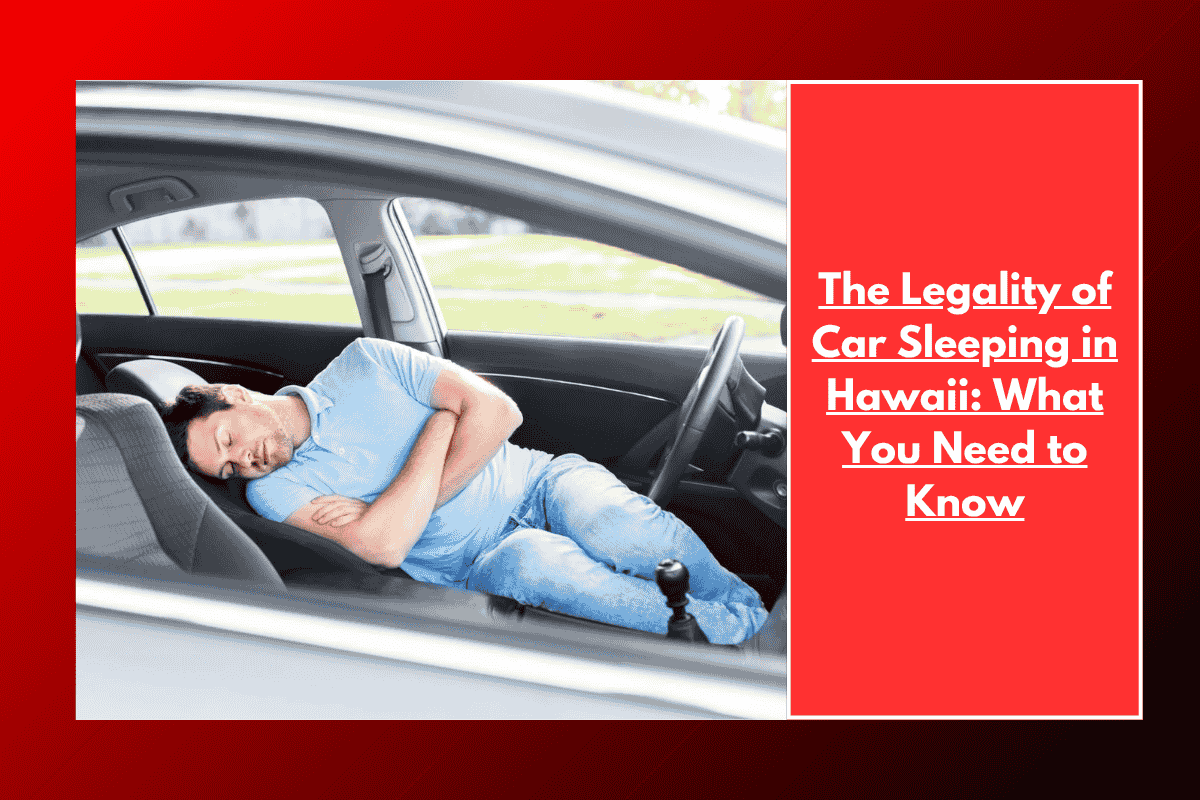If you’re traveling or living in Hawaii and considering sleeping in your car, it’s important to be aware of the state and local laws that govern overnight car parking and sleeping in vehicles. While the idea of car camping or resting during a long drive might sound appealing, it’s crucial to understand the legal implications to avoid potential fines or trouble with the authorities.
Here’s an overview of the legality of sleeping in your car in Hawaii, the local rules to keep in mind, and some tips on how to safely and legally sleep in your vehicle while in the Aloha State.
1. Is It Legal to Sleep in Your Car in Hawaii?
Generally, the act of sleeping in your car is not outright illegal in Hawaii. However, there are some significant restrictions and regulations that can make it complicated depending on where you park and how long you plan to stay. Sleeping in your car may be allowed in certain places, but there are local ordinances and restrictions that you need to be mindful of.
- Private Property: If you’re parking on private property, such as a friend’s or family member’s driveway, sleeping in your car is typically not an issue. It is important to get the property owner’s permission beforehand to avoid any issues.
- Public Property: Parking in public areas, such as streets or parks, is more likely to be restricted. Overnight parking is typically not allowed in many public areas, especially in popular tourist spots, residential neighborhoods, or certain beaches.
2. Hawaii’s Local Laws on Car Sleeping
Hawaii’s laws vary by county, and each county has its own set of regulations on sleeping in cars. While the state does not have a statewide law banning car sleeping, it is up to local authorities to enforce rules in their jurisdiction. Here’s a breakdown of the rules in some of Hawaii’s most populous counties:
- Honolulu (Oahu): In Honolulu, which is the largest city in Hawaii, sleeping in your car is generally prohibited in public areas, including beaches, parks, and streets. The city enforces laws against camping on public property without a permit, and this includes sleeping in vehicles. However, there are designated areas like campgrounds where car camping may be permitted with the proper permits.
- Maui: In Maui, the laws around sleeping in your car are similar to those in Honolulu. Sleeping in public areas, including beaches and parking lots, is typically prohibited. However, you can find designated camping areas, such as Haleakala National Park, where car camping is allowed with a permit. Always check local regulations before parking overnight.
- Hawaii Island: On Hawaii Island (Big Island), sleeping in your car is generally not allowed in most public areas. As with other counties, you can sleep in your car if you’re parked on private property with permission, or if you’re in a designated camping area. The Big Island has some remote areas where car camping is more common, especially near beaches or national parks, but it’s important to get the correct permits.
- Kauai: On Kauai, like other counties, sleeping in your vehicle is not permitted in public spaces unless you’re in a designated camping area. There are some spots on Kauai that are more relaxed about parking overnight, but it is always safer to check with local authorities or obtain a permit for overnight stays in public areas.
3. Designated Areas for Sleeping in Your Car
If you’re set on sleeping in your car while visiting Hawaii, here are some of the places where it is generally legal and safe to do so:
- Campgrounds: Many of Hawaii’s state parks and national parks offer campground sites where you can park your vehicle and sleep overnight. For instance, Haleakala National Park on Maui and Kailua-Kona on the Big Island provide car camping opportunities. Remember, a permit is usually required for these sites.
- Rest Areas and Truck Stops: On major highways, some rest areas and designated truck stops may allow overnight parking. While overnight parking is often allowed in these places, be sure to confirm whether overnight stays are permitted.
- Private Property: As mentioned earlier, sleeping in your car is allowed on private property if you get permission from the property owner. This could include parking in a friend’s driveway or renting a private parking space in a location where overnight parking is not restricted.
4. Penalties for Sleeping in Your Car
If you’re caught sleeping in your car in a restricted area, you may face fines or be asked to move. Depending on the location, fines can range from $50 to $500 or more. If you’re found to be camping without a permit in areas like beaches or parks, you could face additional penalties or be removed from the area.
Local authorities in Hawaii often enforce these rules to prevent illegal camping, protect public spaces, and maintain safety in tourist-heavy areas. It’s always best to check local regulations to avoid any unexpected fines or conflicts.
5. Tips for Sleeping in Your Car Legally and Safely in Hawaii
To avoid problems and ensure a comfortable, safe experience while sleeping in your car in Hawaii, follow these tips:
- Look for Official Campsites: Always try to use designated camping sites or overnight parking lots where car sleeping is allowed. This will not only keep you legal but also safer.
- Check Local Ordinances: Research local ordinances before parking in public areas. Many towns and cities in Hawaii enforce no camping laws in public places, and it’s essential to respect them.
- Use Rest Areas or Truck Stops: In some places, truck stops and rest areas are designed for long-term parking. These areas are often safer and more comfortable than street parking.
- Be Mindful of Your Surroundings: When sleeping in your car, always park in a safe and well-lit area. Avoid places that might be isolated or have a high risk of criminal activity.
- Obtain Permits When Necessary: If you’re staying at a campground or national park, be sure to get a permit for car camping. These are often available online or at the park office.
6. Final Thoughts
Sleeping in your car in Hawaii can be a great way to explore the islands on a budget, but it’s important to understand and follow the state and local regulations. With proper planning and an understanding of where and how you can park overnight, you can avoid fines and enjoy a comfortable, safe stay in your vehicle.
Before you decide to sleep in your car, always check the local rules, look for designated camping spots, and respect the community guidelines. Safe travels and enjoy your time in the beautiful islands of Hawaii!
SOURCES
[1] https://law.justia.com/codes/hawaii/title-17/chapter-291c/section-291c-112/
[2] https://health.hawaii.gov/dcab/files/2013/01/Parking-Rules-2020-Standard-6.25.21.pdf
[3] https://codelibrary.amlegal.com/codes/honolulu/latest/honolulu/0-0-0-11582
[4] https://pendulumvans.com/overnight-parking-in-honolulu-oahu-hawaii/
[5] https://manoa.hawaii.edu/commuter/parking-policies/














